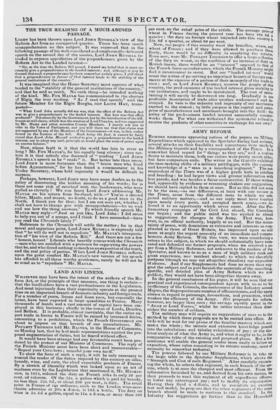THE TRUE READING OF A MUCH-ABUSED PASSAGE.
Ltnerr has been thrown upon Lord JOHN RussELtes view of the Reform Act from an unexpected quarter. There has been much misapprehension on this subject. It was supposed that in the following passage of his well' considered and emphatically-delivered speech on the second day of the session, Lord Jotter RUSSELL in- tended to express approbation of the preponderance given by the Reform Act to the Landed interest- " Sir, at the time the Reform Rill pissed, I stated my belief that it must ne- cessarily give a preponderance to the landed interest; and, although it m ty be deemed that such *preponderance hi, been somewhat unduly given, I still think that a preponderance in favour of that interest tends to the stability of the general institutions of the country." It was imagined that the Home Secretary must approve of what tended to the "stability of the general institutions of the country," and that he said as much. No such thing—he intended nothing of the kind. Mr. Fox MAULS has communicated to the electors of Elgin the true reading. "As I read that speech," said the future Member for the Elgin Burghs, vice LEITH HAY, trans- ported— "What Lord John actually did say was, that the effect of the Reform Act was to give a preponderance to the landed interest. But how was that effect produced ? Not assuredly by the Government, but by the introduction of the 50/. tenant-at-will clause, which was the creation of Lord Chanflos, and was supported by Mr. Hume and other mistaken County Members. I merely a4c you to refer to the Votes of Parliament, and you will there see that that clause was not supported by any of the Members of the Government—it was, in fact, rather forced on the framers of the bill. Such being the fact, it cannot be fairly stated that Lord John Russell wished to give a preponderance to the landed interest, nor to adopt any such principle as would place the scale of power upon an uneven balance."
Now, whose fault is it that the world has lain in error so long ? Mr. FOX MAULE'S, for his equally long silence ; since cer- tain it is that nobody else dreamed of " reading " Lord JOHN RUSSELL'S speech as he " reads" it. But better late than never. . Lord JOHN is more fortunate than the "brave men who lived before Agamemnon," for he has found a commentator in his Under Secretary, whose bold ingenuity it would be difficult to surpass.
Perhaps, however, Lord Joteer may have some doubts as to the policy of discovering the hidden meaning of his words; for is there not some risk of mischief with the landowners, who were gulled so cleverly ? We can fancy Lord JOHN addressing Mr. MauLE on his return from Scotland, with--" You're a shrewd fellow, Maule, and meant, no doubt, to do us a good turn in the North. I thank you for that: but I am not sure yet, whether I shall not have to charge you with misapprehension—let us wait and see how the thing answers." To which friendly speech Mr. MAULS may reply—" Just as you like, Lord John : I did mean to help you out of a scrape, and I think I have succeeded—have you read the Chronicle lately ?" Reference to the Chronicle will settle the matter ; for in that moral and sagacious print, Lord JOHN RUSSELL is expressly told that "he will do well not to repudiate" Mr. MAULE'S interpreta- tion of " his view of the Reform Bill." And there are not a few " honest, honest" Liberals who heartily concur with the Chronicle —men who are satisfied with a pretence for supporting the powers that be, and who dread nothing so much as an exposition of the truth, and the real policy of parties. When Lord JOHN RUSSELL reflects upon the great comfort Mr. MAULK'S new version of his speech has afforded to all these worthy gentlemen, surely he will not be so cruel as to "repudiate" Mr. MAULE.


























 Previous page
Previous page